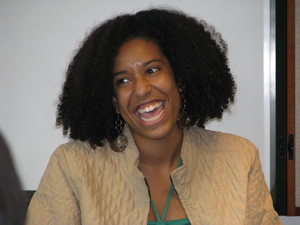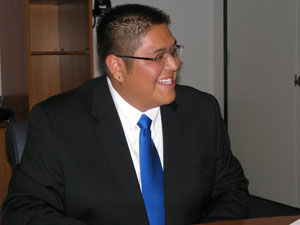A Summer’s Research at NCMHD/NIH
By Egypt Vlymen-Williams, Wesleyan University 2010
 |
Egypt Vlymen-Williams
|
Serving as an intern at the National Center on Minority Health and Health Disparities (NCMHD) has been a phenomenal and rewarding experience. NCMHD researches gaps in health care between minority and rural populations that can be due to various issues such as language barriers and cultural differences. As a neuroscience major at Wesleyan University, with exposure mostly to basic science, this was an eye-opening experience. It gave me a chance to study health in a demographic sense rather than strictly scientific. This summer has given me a chance to look at health in ways I would not have thought to explore. I’ve had countless opportunities to meet brilliant minds that address the problem of health disparities.
This year NCMHD supported six interns from across the nation, a majority of who were brought here through the Directors of Health Promotion and Education (DHPE) program. DHPE assigns everyone in the program to a worksite with a mission to promote public service. In fact, DHPE has 10 Essential Public Health Services and 7 Core Competencies of Health Education to which the interns must adhere. These include assessing the community needs for Health Education, informing and educating the public about health issues, and researching innovative solutions to health problems. I expect to use DHPE as future resource as it follows the interns for five years in order to support their health endeavors. One of my colleagues, and office mate Henry Townsend, came here through the Washington Internship for Native Students (WINS) program. WINS offers students from American Indian, Alaskan Native, and Native Hawaiian backgrounds an opportunity to build leadership skills by working at a federal agency or private firm. Some of their partnerships are with the Department of Justice, Health and Human Services, and the Federal Communications Commission. At American University, the WINS students take courses about issues in these communities which include guest speakers, research projects, and relevant readings.
 |
Janea Peterson
|
Janea Peterson is a rising junior at University of Tennessee Knoxville majoring in speech pathology and audiology. Under Dr. Nathaniel Stinson, she was able to research communication disorders, with a special focus on hearing problems that disproportionately affect minorities. “I chose this particular topic to research because many Americans take their hearing for granted and put unnecessary strain on their ears everyday, unaware of the damage they could be causing.” Janea felt that the ear is often ignored and more information concerning hearing loss should be provided by health officials and organizations.
 |
Tiy Adams
|
Tiy Adams, a medical school student at Howard University’s College of Medicine, looked at mental health issues. She found that people in the African-American community often do not seek treatment for dementia or other related disorders. She found that they are often afraid they will be stigmatized. Moreover, as a medical student studying psychiatry, this summer has connected her clinical and research interests.
 |
Vilmaris Quinones Cardona
|
Another medical student, Vilmaris Quinones Cardona, from the University of Puerto Rico, had the chance to find what faith-based initiatives can do to help improve health conditions. Her research showed that people are more likely to go to church than a doctor. Most of the literature she found only described information on African-Americans and she suggests more information should be published on all ethnicities.
 |
Leticia Tientcheu
|
A native of Cameroon and a junior at George Washington University, Leticia Tientcheu did a literature review about diabetes in the U.S affiliated Pacific Islands of Guam, Republic of Palau, and the Federated States of Micronesia. She found that diabetes and its complications are the number one cause of death in the islands. Her research showed that most of the islanders weren’t aware that 90% of their diabetes is related to excess weight.
 |
Henry Townsend
|
Henry Townsend, from Albuquerque, New Mexico came to DC to study Indian Policy. He found some of the major health disparities in American Indians to be access to health care, quality of care, and inadequate immunization. Possible solutions he recommended were to expand health facilities for Native Americans as well as train American Indian health professionals/health care workers who understand cultural practices and have greater acceptance by native communities.
Most of the interns came here without a clue as what to expect. All of us had heard so many positive comments about NIH and NCMHD that we were excited to have the opportunity to study and learn here. We were not disappointed. Specifically, everyone thoroughly enjoyed the fact that we were encouraged to take advantage of the incredible intellectual resources available at NCMHD and the entire NIH. In addition to our research, all of us spent a lot of time attending conferences and lectures that focused on everything from Cancer health disparities to improving our writing. Some of the conferences came with built in perquisites. Leticia and Vilmaris were able to shake President George W. Bush’s hand when they attended the White House Faith Based Initiative Conference. Henry Townsend was able to take a tour of the White House along with his fellow WINS students.
Networking was among the most important outcomes of the internship. I hope the relationships I formed with several African-American women (MD’s, Ph.D.’s, and MBA’s) will guide me in my academic and career choices. Janea networked with personnel at the National Center on Deafness and Other Communication Disorders who promised to keep her up-to-date with their groundbreaking studies. All of the interns had similar opportunities to meet and connect with the most insightful minds in the science of eliminating health disparities.
Although this summer was hard work, there was still room for recreation. All the interns were able to go out and explore DC. Our social interactions have bonded us in a fraternal way and created a new and lasting support system. I strongly recommend NCMHD as a worksite for a summer experience. As Tiy Adams said, “It is filled with top scientists who have innovative ideas to address some of the most complex and multifaceted issues within our communities.” What more, it is filled opportunities to paths that can lead to a promising future. I will never forget this summer!
(back to top) |

